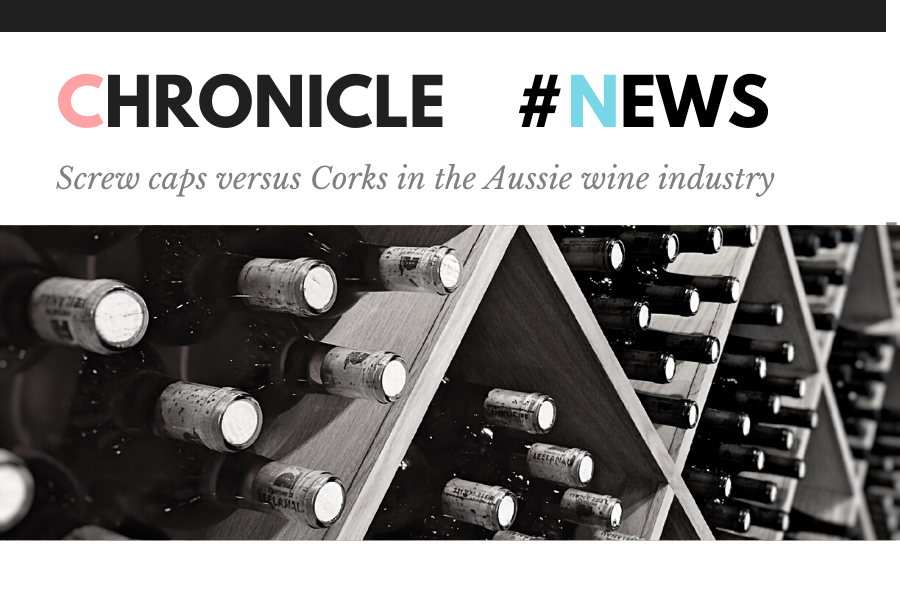Written by Miriam Laurovics
36 billion bottles of wine are produced each year, and 65-80 per cent are closed with cork. So why are so many wineries using cork?
The effort, time and money spent on the entire winemaking process – from harvest to barrel to eventually stored wine – would definitely call for a relieving moment when the wine is sealed. For many winemakers, it is satisfaction at its peak with a pat on the back.
Nowadays, winemakers have more options for sealing their wine. This includes traditional cork, screw cap, synthetic cork, vinoseal or zork.
However, using cork is non-negotiable in many parts of the world . In fact, globally, the cork is the most popular type of wine stopper. This is due to the traditions of infamous Italian winemakers in Italy and France and the habits of their consumers.

Traditional cork
When did corks become a thing?
The cork came about in the 1400s, but it wasn’t until the early 18th century when new and growing businesses adopted the use of corks. Winemakers appreciated the cork’s malleable and squishy substance that could effectively fit in the top of the bottle.
How are corks made?
High-quality cork is stamped out of a single piece of bark from an oak tree that needs to be at least 40 years of age! The major benefit of corks is that air can get into the bottle through one end, and wine can evaporate out through the other. This enables the wine to ‘breathe’ and evolve efficiently which contributes to the ageing process.
However, natural corks are prone to taint the wines from a substance called Trichloroanisole. This is said to be a major drawback, especially in the opinion of Australian and New Zealand winemakers.

Screw caps to the rescue?
90 per cent of Australian and New Zealand wines are topped with screw caps.
In the 1970s, corks were given and prioritized to the oldest, finest European winemakers. This left the wine market in Australia with unwanted, or inferior cork products, being too old, dry, crumbly, or yet easily breakable.
Australian winemakers had to find a solution to avoid cork taint. “Corked wine” is the absence of sherry-like aromas and turns the wine into a musty, wet cardboard taste, making it unpalatable.
They resolved this by using screw caps.

Screw caps require less time to produce and are easier to open, making them a great advantage from a profitability point of view. So needless to say, screw caps do have worthy benefits as well.
However, screw caps are airtight, meaning they do not provide the movement with oxygen exchange and maturation the way cork does. Some consumers associate screw caps as cheap wines and a sign of low-quality wine.
Visiting Amorim Australasia – Australia’s largest importer of cork for the wine industry.
Nathalie Taquet, Owner of Bottli, recently visited Amorim.
“I was impressed by the quality of products and the innovative ideas from the fantastic and determined team. They customize cork according to the brand by printing predefined designs. Their material is impressive and laser printers allow to create interesting new designs. “

The team at Amorim Australasia
With the world evolving and technology booming, there are faster and more affordable ways to test bacteria in corks before the bottling process. At Amorim, each cork is tested according to the chemical reactions that occur between the cork and the wine to verify the quality of each batch.
So, Screw caps or Corks?
There are cons and pros for both , and so it really comes down to the person’s preference.
If you are someone who likes a sense of ritual and admires traditional formalities then pulling the cork is for you. On the other hand, if you’re someone who seeks convenience then cracking the cap with a flick of the wrist is for you.
Nathalie says, “Being French, I can’t help but have a cultural preference for cork. But when I came to Australia, I learnt the advantages of the screw cap and many high-end producers are using them.”
Are you are cork or screw cap fan?! Let us know in the comments below!
References:
https://www.smh.com.au/business/australias-wine-screwcap-revolution-20170628-gx0e3l.html
https://en.wikipedia.org/wiki/Alternative_wine_closure
https://www.theglobeandmail.com/life/food-and-wine/article-why-are-we-still-debating-the-merits-of-cork-vs-screw-cap-closures-for/.

